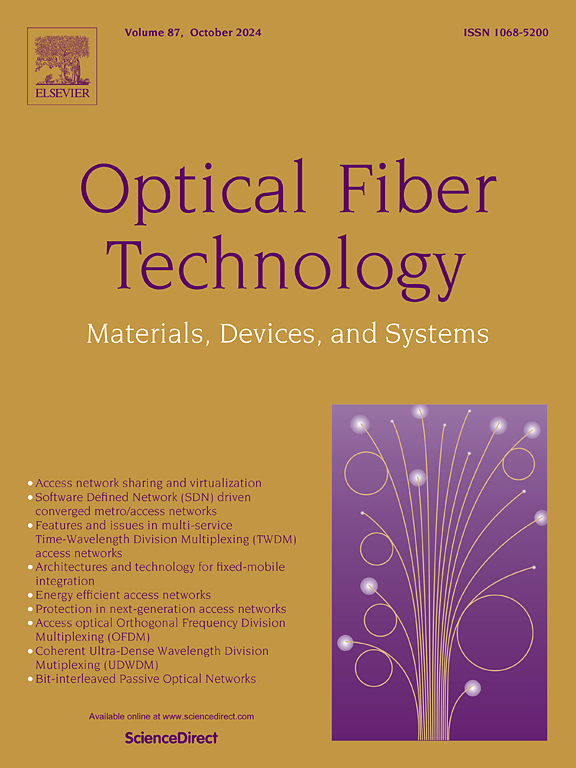Real-time implementation of non-integer oversampling timing recovery algorithm incorporating IQ compensation for coherent optical communication systems
IF 2.6
3区 计算机科学
Q2 ENGINEERING, ELECTRICAL & ELECTRONIC
引用次数: 0
Abstract
In coherent optical communication systems, digital signal processing (DSP) plays a critical role in achieving efficient signal recovery and demodulation. The traditional analog-to-digital converter (ADC) must operate at integer oversampling (≥2 samples per symbol, SPS) to support accurate timing recovery algorithms. However, the computational complexity involved in processing individual symbols presents significant challenges in meeting the low-power consumption demands of high-speed optical modules. In this paper, we propose a timing recovery algorithm based on the Modified-Godard algorithm for coherent optical communication systems that can work under non-integer baudrate oversampling, which greatly reduces the complexity of DSP and effectively alleviates the demand for ADC with high oversampling rates. Our algorithm enables simultaneous timing recovery and IQ skew compensation in the frequency domain (FD). In order to ensure the reliability of our DSP algorithms under non-integer baudrate oversampling, we analyze and simulate the impact of the laser frequency offset and IQ skew on the timing recovery algorithm. Finally, the DSP algorithms are further implemented on a field-programmable gate array (FPGA) chip. The experimental results demonstrate that the real-time coherent receiver achieves a minimum received optical power of −35-dBm at the KP4-FEC BER threshold, while reducing the ADC sampling rate by 42.9 % compared to conventional timing recovery schemes.
相干光通信系统中含IQ补偿的非整数过采样定时恢复算法的实时实现
在相干光通信系统中,数字信号处理(DSP)对于实现高效的信号恢复和解调起着至关重要的作用。传统的模数转换器(ADC)必须在整数过采样(每个符号≥2个采样,SPS)下工作,以支持精确的时序恢复算法。然而,处理单个符号的计算复杂性对满足高速光模块的低功耗要求提出了重大挑战。本文提出了一种基于修正戈达尔算法的相干光通信系统时序恢复算法,该算法可以在非整数波特率过采样条件下工作,大大降低了DSP的复杂度,有效缓解了对高过采样率ADC的需求。我们的算法能够在频域(FD)同时实现定时恢复和IQ偏差补偿。为了保证DSP算法在非整数波特率过采样情况下的可靠性,我们分析和模拟了激光频偏和IQ偏差对时序恢复算法的影响。最后,在现场可编程门阵列(FPGA)芯片上进一步实现了DSP算法。实验结果表明,在KP4-FEC误码率阈值下,实时相干接收机的最小接收光功率为- 35 dbm,与传统的定时恢复方案相比,ADC采样率降低了42.9%。
本文章由计算机程序翻译,如有差异,请以英文原文为准。
求助全文
约1分钟内获得全文
求助全文
来源期刊

Optical Fiber Technology
工程技术-电信学
CiteScore
4.80
自引率
11.10%
发文量
327
审稿时长
63 days
期刊介绍:
Innovations in optical fiber technology are revolutionizing world communications. Newly developed fiber amplifiers allow for direct transmission of high-speed signals over transcontinental distances without the need for electronic regeneration. Optical fibers find new applications in data processing. The impact of fiber materials, devices, and systems on communications in the coming decades will create an abundance of primary literature and the need for up-to-date reviews.
Optical Fiber Technology: Materials, Devices, and Systems is a new cutting-edge journal designed to fill a need in this rapidly evolving field for speedy publication of regular length papers. Both theoretical and experimental papers on fiber materials, devices, and system performance evaluation and measurements are eligible, with emphasis on practical applications.
 求助内容:
求助内容: 应助结果提醒方式:
应助结果提醒方式:


